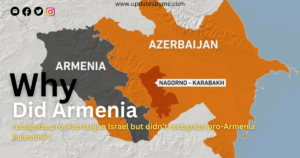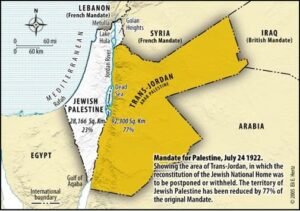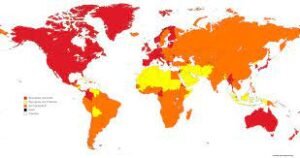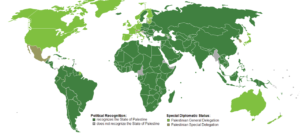The error in acknowledgment among Palestine and Israel is a perplexing issue established in verifiable, international, and social variables. Examining the following key aspects is necessary for comprehending the intricacies of this disparity:
Authentic Setting: The verifiable scenery of the Israeli-Palestinian struggle, tracing all the way back to the mid-twentieth hundred years, assumes an essential part. Disagreements about land, removal of populaces, and clashing public accounts have powered pressures, prompting disparate points of view on the authenticity of each side’s cases to statehood.
Worldwide Strategy: The acknowledgment of states is many times molded by worldwide strategy. While Israel has gathered acknowledgment from various nations and worldwide associations, Palestine’s statehood has been recognized by a subset of countries. The varying degrees of recognition are influenced by the intricate nature of diplomatic relationships, alliances, and geopolitical interests.
Joined Countries Elements: The United Nations (UN) has played a crucial mediation role in the Israeli-Palestinian conflict. Global recognition patterns have been influenced by a variety of UN Security Council and General Assembly resolutions and positions. The UN’s association mirrors the more extensive worldwide local area’s position on the issue.
Regional Questions and Lines: The continuous disagreements about boundaries and domains, including the situation with Jerusalem, influence the acknowledgment quandary. Contending cases to land and challenged borders add to the intricacy of remembering one state over the other.
Social and Strict Variables: Social and strict contemplations contribute essentially to the acknowledgment partition. Jerusalem’s strict importance to Judaism, Christianity, and Islam adds a layer of intricacy, impacting how various countries fall in line with one or the other Israel or Palestine.
Why is Palestine not recognized as an independent nation by the majority of nations?
The disparity in recognition between Israel and Palestine is a complicated problem rooted in cultural, historical, and geopolitical factors. Understanding the complexities of this dissimilarity includes analyzing the accompanying key viewpoints:
Authentic Setting: The verifiable scenery of the Israeli-Palestinian clash, tracing all the way back to the mid-twentieth 100 years, assumes a pivotal part. Tensions have been exacerbated by land disputes, population displacement, and competing national narratives, which have resulted in divergent viewpoints regarding the veracity of each side’s claims to statehood.
Global Tact: The acknowledgment of states is many times formed by global strategy. While Israel has collected acknowledgment from various nations and global associations, Palestine’s statehood has been recognized by a subset of countries. The complexities of conciliatory relations, coalitions, and international interests add to the fluctuating levels of acknowledgment.
Joined Countries Elements: The job of the Assembled Countries (UN) in interceding the Israeli-Palestinian clash has been focal. Contrasting goals and positions inside the UN Security Committee and General Get together have affected worldwide acknowledgment designs. The UN’s association mirrors the more extensive worldwide local area’s position on the issue.
Borders and Disputes Territorially: The continuous disagreements about boundaries and regions, including the situation with Jerusalem, influence the acknowledgment issue. Contending cases to land and challenged borders add to the intricacy of remembering one state over the other.
Social and Strict Elements: Social and strict contemplations contribute altogether to the acknowledgment partition. Jerusalem’s strict importance to Judaism, Christianity, and Islam adds a layer of intricacy, impacting how various countries fall in line with one or the other Israel or Palestine.
Why did Armenia recognize pro-Azerbaijan Israel but didn’t recognize pro-Armenia Palestine?
The acknowledgment choices made by nations are impacted by a blend of verifiable coalitions, international contemplations, strategic relations, and local elements. On account of Armenia perceiving supportive of Azerbaijan Israel while not perceiving favorable to Armenia Palestine, a few elements might add to this nuanced position:

Verifiable Ties and Unions: Armenia might have verifiable binds or partnerships with Israel, particularly assuming the two nations have shared interests or have collaborated previously. Recognition decisions may be influenced in significant ways by historical connections and geopolitical considerations.
Strategic Relations and Interests: Strategic relations and public interests are key drivers of acknowledgment choices. Maintaining positive relations with Israel may have strategic advantages for Armenia, particularly if they are in line with broader diplomatic objectives or considerations of regional stability.
Territorial Elements: The complex international scene of the South Caucasus, where Armenia and Azerbaijan are arranged, can impact acknowledgment choices. Armenia might gauge its relations with Israel with regards to territorial elements and the more extensive political scene of the Center East.
Israeli-Azerbaijani Relations: The acknowledgment of Israel by Armenia may be impacted by the elements of Israeli-Azerbaijani relations. In the event that Armenia tries to keep up with positive relations with Azerbaijan’s partner (Israel) to encourage provincial soundness, it might affect its position on other international issues, like the acknowledgment of Palestine.
Difficult exercise in Discretion: Countries frequently participate in a sensitive difficult exercise in global discretion, considering different connections and interests. Armenia’s acknowledgment choices might be important for a more extensive political methodology pointed toward keeping up with harmony in its unfamiliar relations.
It’s essential to take note of that acknowledgment choices are mind boggling and diverse, and they can develop over the long run in light of changing international conditions. States evaluate their inclinations, partnerships, and local elements while going with choices on perceiving different countries. Understanding the many-sided trap of international contemplations can give experiences into why a nation might decide to remember one country over another.
What is the reason behind the US’s refusal to recognize Palestine as an independent state or acknowledge its existence?
The US’s position on perceiving Palestine as a free state or recognizing its presence is impacted by various elements, including authentic, political, conciliatory, and key contemplations:

Authentic Help for Israel: The US has kept a longstanding and powerful collusion with Israel since its foundation in 1948. This partnership is established in shared majority rule values, authentic ties, and vital interests in the Center East. As a lifelong fan of Israel, the U.S. government has generally adjusted its strategies to Israeli situations on issues connected with the Israeli-Palestinian clash.
Harmony Cycle Elements: The U.S. has generally assumed a focal part in intervening the Israeli-Palestinian harmony process. Endeavors to work with talks and accomplish a two-state arrangement have been a foundation of U.S. international strategy in the locale. The U.S. government has frequently supported for direct talks among Israel and the Palestinians to determine remarkable issues, including the situation with Palestinian statehood.
Security Concerns: The U.S. focuses on the security interests of Israel, seeing the country as a vital partner in the unstable Center East district. The U.S. government’s help for Israel’s security and guard goals shapes its way to deal with the Israeli-Palestinian struggle and impacts its position on Palestinian statehood.
International Contemplations: The Israeli-Palestinian clash is entwined with more extensive international elements in the Center East. The U.S. government cautiously explores its associations with different nations in the district, considering vital coalitions, territorial security, and counterterrorism endeavors. Acknowledgment of Palestinian statehood could have suggestions for provincial elements and U.S. interests in the Center East.
Homegrown Governmental issues: Homegrown political contemplations likewise impact U.S. strategy towards Israel and Palestine. Political help for Israel appreciates bipartisan moving in the U.S. Congress, and popular assessments of public sentiment reliably show solid help for Israel among the American public. Thusly, U.S. policymakers might calculate homegrown political elements while forming arrangements connected with the Israeli-Palestinian struggle.
In general, the US’s refusal to perceive Palestine as a free state or recognize its presence mirrors a perplexing transaction of verifiable coalitions, strategic needs, security concerns, international elements, and homegrown governmental issues. The U.S. government’s way to deal with the Israeli-Palestinian struggle is directed by a blend of these elements as it looks to adjust its help for Israel with endeavors to advance harmony and strength in the locale.
Was there ever a time where Palestine was an independent state, not ruled by another country?
Over the entire course of time, Palestine has been essential for different domains and elements, yet the idea of a completely free Palestinian state remains discussed. Here is a brief synopsis:

Under Ottoman Rule: Palestine was a part of the Ottoman Empire for centuries, and the Ottomans ran the country until the end of World War I, when the empire collapsed.
British Mandate Period: Following The Second Great War, Palestine went under English organization as a component of the Class of Countries order framework. During this period, known as Compulsory Palestine, the domain was not an autonomous state yet rather under English control.
1948 Bedouin Israeli Conflict: In 1948, the Territory of Israel was laid out, prompting the Bedouin Israeli Conflict and the dislodging of a huge number of Palestinians. During this contention, adjoining Middle Easterner states involved pieces of the domain assigned for the Bedouin state under the UN parcel plan.
Israeli Occupation: Following the Six-Day Battle in 1967, Israel involved the West Bank, including East Jerusalem, and the Gaza Strip, domains that had been under Jordanian and Egyptian control, separately. From that point forward, these regions have been dependent upon Israeli military occupation.
Palestinian Power Independence: The Oslo Accords during the 1990s prompted the foundation of the Palestinian Power, which oversees specific region of the West Bank under restricted independence. However, Palestine has not yet achieved full sovereignty and independence.
In synopsis, while Palestine has a rich history and social legacy, it has not been a free state in the cutting edge sense. The journey for Palestinian statehood stays a focal issue in the Israeli-Palestinian struggle, with continuous discussions, harmony drives, and international difficulties molding the way toward possible freedom.
What countries don’t recognise Palestine as a state?
As of the latest available information, there are several countries that do not formally recognize Palestine as a sovereign state. The recognition of Palestine as a state varies among nations and is influenced by a variety of factors including geopolitical considerations, diplomatic relations, and regional dynamics. Some of the countries that do not recognize Palestine as a state include:

- United States
- Canada
- Australia
- Israel
- Brazil
- Mexico
- Guatemala
- Honduras
- Panama
- Micronesia
- Marshall Islands
- Nauru
- Palau
- Kiribati
- Tuvalu
It’s important to note that recognition of Palestine as a state is a complex and politically sensitive issue, and the list of countries that recognize Palestine may evolve over time based on changing geopolitical dynamics and diplomatic relations.
To find out about international strains and strength, you can peruse our blog entry named How could Finland not simply surrender assuming Russia attacked them?.
Which countries do not recognize Israel?
he map above shows who does and does not have diplomatic relations with the State of Israel. Currently 36 countries do not recognize and/or have foreign relations with Israel.This includes 15 states that did at one point in the past but now, for variety of reasons, do not. Interestingly, this includes several Latin American countries.

The following states have never recognized and/or had foreign relations with Israel:
- Afghanistan
- Algeria
- Bangladesh
- Bhutan
- Brunei
- Comoros
- Djibouti
- Indonesia
- Iraq
- Kuwait
- Lebanon
- Libya
- Malaysia
- North Korea
- Pakistan
- Saudi Arabia
- Somalia
- Sudan
- Syria
- United Arab Emirates
- Yemen
The following countries did have relations with Israel at one point in the past. (Time period of relations and reason for breaking them off are in parenthesis):
- Bahrain (1996–2000; Second Intifada)
- Bolivia (1950–2009; Gaza War)
- Chad (1960–1972; solidarity with the Palestinians)
- Cuba (1950–1973; Yom Kippur War)
- Guinea (1959–1967; unknown but presumable related to 1967 Arab-Israeli war)
- Iran (1948–1951, 1953–1979; Islamic revolution in Iran)
- Mali (1960–1973; pressure from neighboring countries)
- Morocco (1994–2000; Second Intifada)
- Mauritania (2000–2009; Gaza War)
- Nicaragua (1948–1982, 1992–2010; Gaza flotilla raid)
- Niger (1960–1973, 1996–2002; Second Intifada)
- Oman (1996–2000; Second Intifada)
- Qatar (1996–2009; Gaza War)
- Tunisia (1996–2000; Second Intifada)
- Venezuela (1950–2009; Gaza War)
Conclusion international contemplations and conciliatory relations. As conversations encompassing Palestinian statehood keep on advancing, understanding the different points of view and elements included is fundamental for exploring the intricacies of worldwide relations in the Center East and then some.
For solid facilitating and space administrations, think about Hostinger, a confided in supplier in the business. Join with Hostinger utilizing my outside reference here to appreciate quality facilitating arrangements and backing.